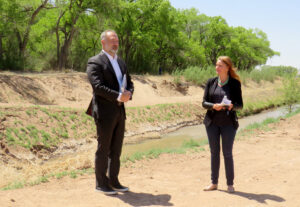Maine hydro project supporters sue to block referendum

Supporters of a controversial hydropower transmission line that would run through Maine are asking a state court to split a proposed referendum seeking to kill the project into separate questions.
The lawsuit, filed by state Rep. Chris Caiazzo D-Scarborough, calls for splitting the referendum into three questions on the November ballot, asking voters if transmission lines on public land should require a two-thirds vote of the legislature; whether large scale transmission lines on public land should require a similar vote; and should the state’s voters ban transmission lines in the upper Kennebec region.
In February, Secretary of State Shenna Bellows certified more than 80,000 signatures turned in by opponents of the project, clearing a major hurdle to putting the issue before voters.
But the lawsuit asks the superior court to force Bellows to reverse her decision to certify the referendum. Supporters of the project say splitting the referendums into separate questions will allow voters to “better understand” the issue and make decisions about specific aspects of the hydropower project.
“Maine voters could reasonably have different opinions on the different changes to Maine statutes proposed by the initiative,” the lawsuit reads.
But opponents of the hydropower project say the litigation is a last-ditch attempt to defeat the referendum by confusing voters.
Sandi Howard, who heads the No CMP Corridor PAC, a coalition of environmental groups opposed to the project, said critics of the project were expecting a lawsuit.
“There’s never been a doubt that CMP would someday challenge our petition language because from the start, CMP has been terrified of facing the will of Maine voters (it’s own customers),” she said in a written statement. “Clearly, CMP saw the same polling data as we did last week that shows that the tens of millions they’ve already spent to promote this deeply unpopular project hasn’t moved the needle.”
The referendum, as currently worded, would ask voters: “Do you want to ban the construction of high-impact electric transmission lines in the Upper Kennebec Region and to require the Legislature to vote on other such projects in Maine retroactive to 2014, with a two-thirds vote required if a project uses public lands?”
Opponents of the CMP project had gathered enough signatures to put a similar question to voters in the Nov. 3 elections, but the state’s Supreme Judicial Court deemed it unconstitutional.
The latest referendum seeks to ban transmission lines in the Upper Kennebec region and require legislative approval of transmission lines longer than 50 miles, which would effectively block the CMP project and require similar plans to be approved by the Legislature.
Central Maine Power’s $1 billion New England Clean Energy Connect calls for providing up to 1,200 megawatts of Canadian hydropower to the New England region.
The companies say the project will create jobs, help green the regional power grid and reduce greenhouse gas emissions that scientists say are contributing to climate change.
The utility argues that the clean energy project is good for the environment and it will reduce carbon emissions that scientists say are contributing to climate change.
Opponents say the project would carve through scenic swaths of untouched forest in the North Maine Woods and lead to a loss of jobs and recreational tourism.
The No CMP Corridor PAC, a coalition of environmental groups opposed to the project, had gathered enough signatures to put a similar question to voters in the Nov. 3 elections, but the state’s Supreme Judicial Court deemed it unconstitutional.
The new referendum seeks to ban transmission lines in the Upper Kennebec region and require legislative approval of lines longer than 50 miles, which would effectively block the CMP project and require similar plans to be approved by the Legislature.
The hydropower project has cleared regulatory hurdles, including approval by Maine’s Department of Environmental Protection and the U.S Army Corps of Engineers.
In January, the project was granted a presidential permit by then-President Donald Trump that allows the transmission line to cross the Canadian border.
But U.S. Rep. Jared Golden and other state officials have asked the Biden administration to rescind the order.
This article was originally posted on Maine hydro project supporters sue to block referendum







